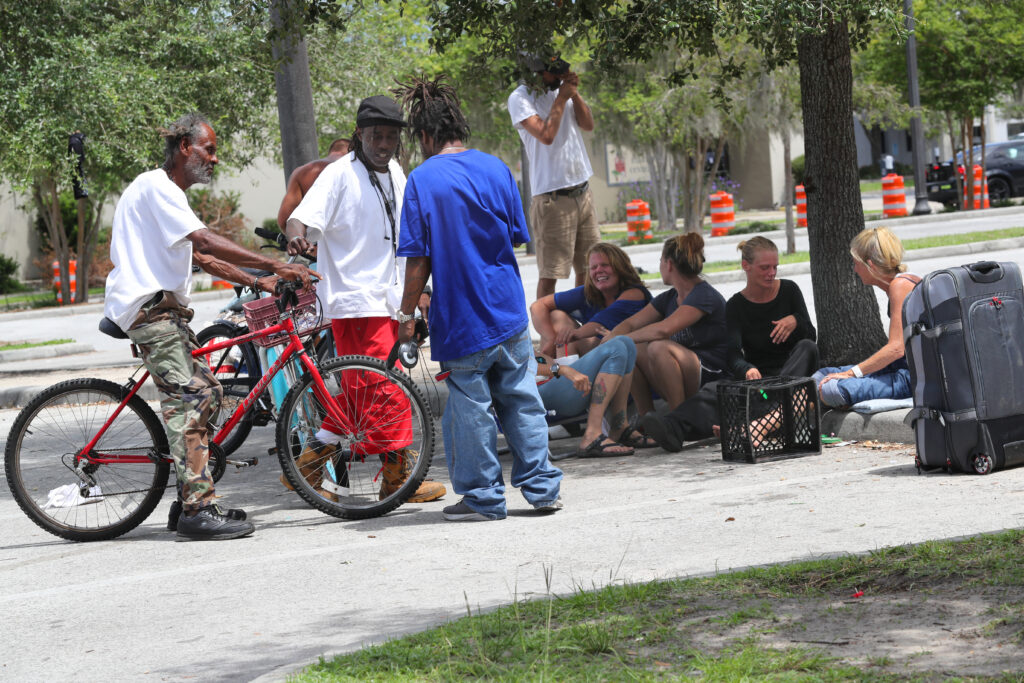City to weigh open-air homeless shelter… again

Homeless people gather together in a parking lot near the intersection of Northwest First Avenue and Northwest Third Street in Ocala, Fla. on Monday, July 20, 2020. The homeless people who stay and live in the parking lot have become a familiar sight recently in downtown Ocala. Many of the homeless say that drug dealers come and drive up to deal in the parking lot and that the Ocala Police Department ignores the problem. [Bruce Ackerman/Ocala Gazette] 2020.

Homeless people gather in a parking lot near the intersection of Northwest First Avenue and Northwest Third Street in Ocala in this July file photo. The Ocala City Council is considering an ordinance to allow an emergency, open-air shelter. [Bruce Ackerman/Ocala Gazette]
The council will introduce a zoning change ordinance to allow an outdoor emergency shelter to operate in conjunction with an existing organization such as Interfaith Emergency Services or the Salvation Army.
“I’m needing a special exception to do it legally on my property,” said Karla Grimsley, Interfaith’s CEO, in a text message. “It would allow us to work with individuals who are chronically homeless and can’t be sheltered otherwise due to criminal history, mental illness or other extenuating circumstances.”
Current shelters in Marion County have requirements for entry, including background checks or drug and alcohol use policies.
The proposed emergency shelter would offer a “low-barrier” place to stay, subject to fewer requirements.
The emergency shelter would serve as a temporary solution in the absence of a permanent low-barrier shelter.
“The site will include shade structures that allow the homeless population to be in a safe location (out of the public right-of-way), but easily accessible to police and supporting service agencies,” according to documents filed with the city.
The shelter would include access to bathrooms, water and other services during operating hours. A fence must surround the area.
Shelter staff will be responsible for managing and monitoring the outdoor site. Occupants will be required to be inside the fenced area by 10 p.m. each night and comply with the noise ordinance.
“It would provide a safe place for them to sleep (with security) while they are engaging in case management with our Homeless Services Team,” Grimsley explained.
The city’s handling of the homeless has faced multiple court challenges, including a February federal court ruling ordering the halt of arrests of homeless people sleeping in public.
In September 2019, The ACLU of Florida, Southern Legal Counsel and Andy Pozzuto sued the city, arguing the public lodging ordinance violated constitutional rights.
On Feb. 8, the court ruled arresting homeless people who don’t have access to shelters is cruel and unusual punishment violating the Eighth Amendment. Issuing trespass warnings without a process for appeal violated the 14th Amendment’s due process clause.
The city responded by amending the ordinance to remove the word “homeless” and updated its trespass warning policy.
In April, the ACLU and the Southern Legal Counsel again sued the city, arguing its panhandling ordinances were unconstitutional.
The groups argue the panhandling ordinances infringe on the First and Fourteenth Amendments and criminalizes asking for help.
The city first adopted its “roadway solicitation” ordinance on Feb. 5, 2008, making it unlawful for any person to stand in the street, highway, median or bicycle path and solicit or attempt to solicit from those in vehicles.
In 2018, the city made it unlawful to panhandle within 20 feet of business entrances and exits; bus stops and other public transportation facilities; ATMs and similar machines; any parking lot, parking garage parking meter or parking pay station operated by the city; public restrooms and gas pumps. It also prohibits panhandling after dark and expands the definition of “aggressive panhandling,” which includes obstructing, blocking or impeding an individual or group of people from passing by a panhandler.
“Ocala’s ordinances prohibiting people from asking for help are unconstitutional under the First and Fourteenth Amendments,” said Chelsea Dunn of the Southern Legal Counsel in a press release. “Every individual, in this case, has been subject to arrest based on the content of their speech. They have been jailed and assessed fines for acts as harmless as asking a stranger for a cigarette.”
The city first considered the idea of an outdoor shelter in 2018. That proposal was for a 30-by-82-foot pavilion. The pavilion was to include 15 picnic tables, two bathrooms, a speaker system and office space.
However, the pavilion plan fizzled when the city and the Marion County Commission could not agree on who would pay for the $508,000 project.
It’s unclear how much the current proposed project would cost. However, Grimsley said, Interfaith is prepared to fund the project with support from the Joint Office of Homelessness.
After Tuesday’s first reading, the zoning change will be up for final approval on May 18. After that, the city would require detailed plans for the shelter from Interfaith.
“We hope it will only be temporary and that a separate low-barrier shelter would open at some point in our county,” Grimsley said.






